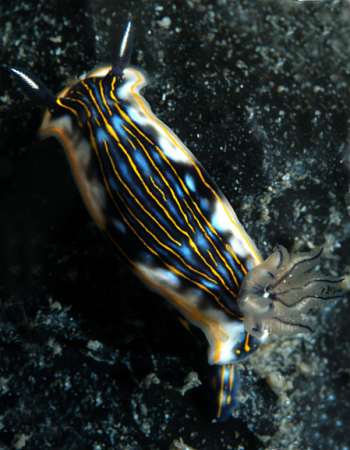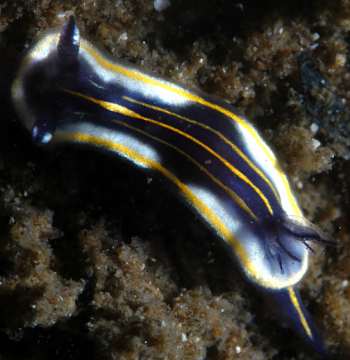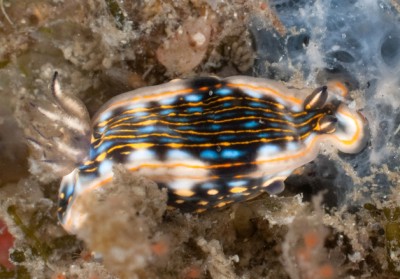

Hypselodoris ruthae
Marcus & Hughes, 1974
Order: NUDIBRANCHIA
Suborder: DORIDINA
Superfamily: EUDORIDOIDEA
Family: Chromodorididae
DISTRIBUTION
Caribbean
PHOTO
Upper: west coast of St. Vincent Is.. Caribbean. Depth: 30 feet. Length: 1 inch. July 2003. sand/muck bottom. Photo: Keri Wilk. Lower: ReefNet Point, St. Vincent Is., Caribbean. Depth: 70 feet. Length: 0.5 inch. July 2005. mucky bottom adjacent to a steeply sloping reef. Photo: Keri Wilk.
Originally described from Barbados as having a blue black mantle with a white border broken about midway down each side by the widening of the bluish background colour in this region. There is also a yellow submarginal line around the mantle edge, and a variable number of longitudinal yellow lines down the mantle, the number of lines increasing with the size of the animal. There can also be scattered blue spots. The rhinophores are dark blue with a white vertical line on the upper anterior and posterior edges, the posterior one being twice a s long as the naterior one. The gills tralnslucent clear in juveniles, become white in adults. There is a dartk blue line along the inner edge of each gill. Grows to at least 25 mm long but there are few published records of this species. Humann (1992) reports that it feeds on the blue sponge Dysidea janiae.
-
Marcus, Ev. & Hughes, H.P. (1974) Opisthobranch mollusks from Barbados. Bulletin of Marine Science, 24(3): 498-532.
Rudman, W.B., 2005 (October 20) Hypselodoris ruthae Marcus & Hughes, 1974. [In] Sea Slug Forum. Australian Museum, Sydney. Available from http://www.seaslugforum.net/find/hypsruth
Related messages
Feeding Hypselodoris ruthae in Florida [2]
May 20, 2009
From: Linda Ianniello


Concerning message #20832:
Dr. Bill, here is another image of H. ruthae feeding on a sponge. I hope it helps verify its food source.
Regards, Linda I.
Locality: Lake Worth Lagoon, 15 feet, Florida, USA, Atlantic, 18 Apr 2009, Tidal intracoastal. Length: 1.5 inches. Photographer: Linda Ianniello.
lindai1@bellsouth.net
Ianniello, L.M., 2009 (May 20) Feeding Hypselodoris ruthae in Florida [2]. [Message in] Sea Slug Forum. Australian Museum, Sydney. Available from http://www.seaslugforum.net/find/22485
Dear Linda,
Thanks for this and your accompanying message [#22484] which also records this species on this blue sponge. It is clear from your photo that the sponge is Dysidea etheria, which from the available evidence, appears to be the preferred food sponge of Caribbean species of Hypselodoris. However it is too early to stop making more feeding observations because there are many species we have no information for, and for most species we know very little.
Best wishes,
Bill Rudman
Feeding Hypselodoris ruthae in Florida [1]
May 20, 2009
From: Linda Ianniello


Concerning message #20832:
Dr. Bill, here is an image of a Hypselodoris ruthae feeding on a sponge, for your "feeding" collection.
Locality: Beach dive, 10 feet, Florida, USA, Atlantic, 2 Feb 2004, Coral Reef. Length: approx. 1.5 inches. Photographer: Linda Ianniello.
Regards,
Linda I.
lindai1@bellsouth.net
Ianniello, L.M., 2009 (May 20) Feeding Hypselodoris ruthae in Florida [1]. [Message in] Sea Slug Forum. Australian Museum, Sydney. Available from http://www.seaslugforum.net/find/22484
Dear Linda,
Thanks for another addition. From its colour I am pretty sure it is the same as the sponge in Anne Dupont's earlier message [#20832]. I can't see a lot of structure in this photo, but from your accompanying message [#22485], the sponge is certainly a species of Dysidea, and from its colour I would say Dysidea etheria.
Best wishes,
Bill Rudman
Feeding Hypselodoris ruthae in Florida
September 28, 2007
From: Anne DuPont

Concerning message #20272:
Hello Bill,
Thank you for your new paper on a Review of chromodorid feeding. Here is some more information for you. I observed this Hypselodoris ruthae which appeared to be feeding on the bluish sponge. As the nudibranch would move, I could see a black area where it had been feeding. Hope this is helpful to you.
Locality: West Palm Beach, Florida , 15 feet, USA, Atlantic Ocean, 16 August 2007. Length: Appx 10mm . Photographer: Anne DuPont.
Thank you so much for all the wonderful work you do on the Forum.
Cordially,
Anne DuPont
Delray Beach, Florida, USA
akdupont@bellsouth.net



Dear Anne,
Thanks Anne,
If the rate of new observations continues at the present pace it won't be long before we will have enough information for a 'Part 2' of the feeding review.
It's a bit hard to see enough detail in the sponge skeleton, but I am pretty sure it is a species of Dysidea which is what this species seems to feed on
Best wishes,
Bill Rudman
Hypselodoris ruthae (juvenile?) from St. Vincent
October 21, 2005
From: Les Wilk

Hi Bill;
Here's the only Hypselodoris ruthae we encountered during a 5-week field trip to the Caribbean island of St. Vincent. It was chugging away over the muck, fairly deep. With only 3 gold lines down its back I presume it's a juvenile.
Locality: ReefNet Point, St. Vincent Is., Caribbean. Depth: 70 feet. Length: 0.5 inch. July 2005. mucky bottom adjacent to a steeply sloping reef. Photographer: Keri Wilk
Les Wilk
wilk@reefnet.ca
Wilk, L., 2005 (Oct 21) Hypselodoris ruthae (juvenile?) from St. Vincent. [Message in] Sea Slug Forum. Australian Museum, Sydney. Available from http://www.seaslugforum.net/find/15077
Dear Les,
It's certainly interesting to compare this juvenile with the adults in your other message [#15078]. As you note, in this animal there are only 3 longitudinal yellow lines and no indication of the light blue colouration. The white patches on the rhinophores are present, and so provide a useful link between the different colour forms, but the gills have yet to develop their white colouration and so appear blue.
Best wishes,
Bill Rudman
Hypselodoris ruthae (adult?) from St. Vincent
October 21, 2005
From: Les Wilk

Hi Bill;
I'm sorting through a multi-year backlog of unlabelled invertebrate images and found these photos. Is this an adult Hypselodoris ruthae?
Locality: west coast of St. Vincent Is.. Caribbean. Depth: 30 feet. Length: 1 inch. July 2003. sand/muck bottom. Photographer: Keri Wilk
Les Wilk
wilk@reefnet.ca



Dear Les,
The photos we now have on the Forum are giving us a much better idea of the colour pattern of this species. Your photos confirm the blue line up the innner edge of each gills and show at least the posterior white patch on each rhinophore. Your animal has a more complex pattern than many of the earlier ones. Either the presence of yellow lines, and the light blue, is variable, or perhaps as you suggest, they are absent in juveniles.
Best wishes,
Bill Rudman
Hypselodoris ruthae from West Palm Beach, Florida
May 18, 2005
From: Paul Osmond

Bill,
I have been looking through some older images I know I haven't sent this way before - here is an image of a Hypselodoris ruthae as it moves across the rubble on the ocean floor in the shallows at Phil Foster Park in West Palm Beach, Florida.
Locality: Phil Foster Park, West Palm Beach, Florida, USA. Atlantic Ocean.
Depth: 4 m. Length: 20 mm. 22 May 2004.Shallow muck, intercoastal. Photographer: Paul Osmond
This was the second time I had seen this species in Florida - the previous time I had a wide-angle lens on and that wasn't going to work for a 20mm long nudibranch.
This shallow shore dive site has always been one of the best macro sites in Florida which unfortunately closed in 2004 due to hurricane damage which led to further sewage leaks into the area. Rumours are it is being dived again (although still officially closed) and may reopen soon.
Yours,
Paul
www.deepseaimages.com
marriard@deepseaimages.com


Thanks Paul,
It's great to get some photos showing the detailed colour pattern of this species.
Best wishes,
Bill Rudman
Re: Hypselodoris ruthae from Connecticut?
November 27, 2003
From: Dan Huber

Hi, wanted to update my earlier find. Found this guy again in my tank, a little bigger and with more color now, maybe i have the right sponge in my tank for him/her. Also a better pic.
Dan Huber
docforestal@comcast.net
Huber, D., 2003 (Nov 27) Re: Hypselodoris ruthae from Connecticut?. [Message in] Sea Slug Forum. Australian Museum, Sydney. Available from http://www.seaslugforum.net/find/11515Thanks Dan,
Bill Rudman
Re: Hypselodoris ruthae from Connecticut?
November 24, 2003
From: Dan Huber
Dear Bill
In answer to your question, the live rock this little guy came in on is from the Caribbean. For my next saltwater tank I hope to harvest live rock and sand from local if possible. It's been 3 weeks, and no sign of the sea slug. There are lots of places to hide, but i am afraid he may have starved. Thanks for the help.
Dan Huber
docforestal@comcast.net
Huber, D., 2003 (Nov 24) Re: Hypselodoris ruthae from Connecticut?. [Message in] Sea Slug Forum. Australian Museum, Sydney. Available from http://www.seaslugforum.net/find/11489Thanks Dan,
Connecticut seemed a bit far north for a Caribbean animal
Cheers
Bill Rudman
Hypselodoris ruthae from Connecticut?
November 19, 2003
From: Dan Huber

Hello,
First time I'm posting here, just found your page. I have recently started (3 weeks) a 55 gallon SW tank now cycled with 33 pounds Live rock and am constantly finding new critters on the rocks. My wife found what looks like a sea slug this morning. I'm still building a collection of books to ID my multiple species of inverts, so I don't know how to go about finding out more about this little fella, is he dangerous, good, how to feed, etc.
Let me describe:
~1cm long, black and white stripes length wise, two head ?eyestalks and on the rear what looks like the fan of a fanworm in black and white.
tough to get a good pic, as he dissappeared.
Thanks for any help.
Dan
Vernon, CT, USA
docforestal@comcast.net
Huber, D., 2003 (Nov 19) Hypselodoris ruthae from Connecticut?. [Message in] Sea Slug Forum. Australian Museum, Sydney. Available from http://www.seaslugforum.net/find/11375Dear Dan,
I see you are from Connecticut. Did you personally collect your live rock in Connecticut? Why I ask is that your nudibranch is Hypselodoris ruthae a species which we know very little about. It is known from the Caribbean and as far north as Florida, so if you collected your animal in Connecticut,, it is quite a bit furtjer north than it has previously been reported. What can I tell you about it? We know very little about its biology and what you see on messages on the Forum is probably all we know. From Linda Ianiello's messages it feeds on a blue sponge, possibly Dysidea janiae. I suspect your live rock may have had a bit of this sponge, or perhaps another food sponge of this species, which has allowed the slug to grow in your aquarium. Whether it has eaten out its only source of food I couldn't say but it is a possibility. Perhaps you should should try and find a sponge looking like the one in Linda's photos for your slug.
If you can confirm where your live rock is from it would be a valuable bit of information
Best wishes
Bill Rudman
Hypselodoris ruthae feeding
March 22, 2003
From: Linda Ianniello


Dr. Bill,
Here is a photo of Hypselodoris ruthae feeding. It is feeding on the same blue sponge as Hypselodoris sp 4, and I just sent you a photo showing H. picta also eating this sponge. This is not a really clear shot of the nudibranch, but it definitely shows that it is eating. I hope these shots help to pin down the favorite food of these guys!
Photographed at a depth of 12' off Deerfield Beach, Florida, in February 2003.
Linda Ianniello
lindai@us.ibm.com
Ianniello, L., 2003 (Mar 22) Hypselodoris ruthae feeding. [Message in] Sea Slug Forum. Australian Museum, Sydney. Available from http://www.seaslugforum.net/find/9375Thanks Linda,
Another very useful piece of information. This looks to be the sponge in your earlier photo which almosts suggests this sponge incorporates sand grains into its tissue. I would really like a photo showing more of the sponge colony so I can hopefully get its identity confirmed.
Best wishes,
Bill Rudman
Hypselodoris ruthae from St. Kitts
September 9, 2002
From: Linda Ianniello

Dear Bill,
Here is a photo of Hypselodoris ruthae from St. Kitts [eastern Caribbean]. It was found at a dive site called Bedroom Bay, at night at a depth of about 40 feet, in July 2002. I also saw a couple at Paradise Reef, at night. They were all small, about 1 inch, and all on a brown sponge. This one shows evidence of feeding on the sponge, however the ones I find at home in Florida seem to feed on the same blue sponge as Hypselodoris sp. 4. (I have a similar shot of the oral veil exposed with one on blue sponge).
Do you think they feed on different sponges in different locations, or are they feeding on something on the sponge? As you mentioned in a prior update regarding this type, they all have the white line down the posterior face of the blue rhinophore club.
Regards,
Linda Ianniello
lindai@us.ibm.com
Ianniello, L., 2002 (Sep 9) Hypselodoris ruthae from St. Kitts. [Message in] Sea Slug Forum. Australian Museum, Sydney. Available from http://www.seaslugforum.net/find/7818Thanks Linda,
This species is reported to feed on a species of Dysidea (Humann, 1992), and the sponge in your photo could well be a species of that genus. Concerning sponge colour, I'm afraid that some sponges occur in variety of colours, indeed in some species the colour can change from one part of a colony to another. This is sometimes due to symbiotic organisms living with the sponge. Chromodorids do indeed feed on sponges and they are fairly species specific. However some chromodorid species do feed on two or three related species of sponge so your sighting of H. ruthae on different coloured sponges could suggest either that the sponge is variable in colour or that the slugs feeds on more than one sponge.
best wishes,
Bill Rudman
Hypselodoris ruthae from Florida
February 5, 2002
From: Linda Ianniello

Hi, Bill,
Here is a shot of Hypselodoris ruthae from Florida. It was found in 15' off Deerfield Beach and was very small, about 1/2". I have also seen it one other time, in the Lake Worth Lagoon. This photo was taken in January, 2002, during the day.
Linda
lindai@us.ibm.com
Ianello, L., 2002 (Feb 5) Hypselodoris ruthae from Florida. [Message in] Sea Slug Forum. Australian Museum, Sydney. Available from http://www.seaslugforum.net/find/6165Thanks Linda,
It's good to get another photo of this species as it helps us to get an idea of the colour pattern. On your photo one distinctive feature is the white line down the posterior face of the blue rhinophore club. When I look carefully at the other photos, even the juveniles from Colombia have a trace of this white. Considering how difficult it is to decide between species and colour variants at present. A character like that might turn out to be an important distinction between species, much like the red spot on the front of the rhinophores of Noumea haliclona is there in all the colour forms of that species.
Best wishes,
Bill Rudman
Hypselodoris ruthae from Colombia
June 4, 2001
From: Elianny Domínguez


Dear Bill,
I think this is Hypselodoris ruthae adult because it fits the description you wrote to Phanor. We found it on a rocky shore (supralitoral) and is 1.6 cm long. [Gaira Bay, Santa Marta, Colombia (Caribbean coast)]
Kind regards,
Elianny Domínguez.
elicelotte@latinmail.com
Domínguez, E. , 2001 (Jun 4) Hypselodoris ruthae from Colombia. [Message in] Sea Slug Forum. Australian Museum, Sydney. Available from http://www.seaslugforum.net/find/4442Dear Elianny,
Your animals certainly look like H. ruthae. It's nice to have an photo of an adult animal.
Best wishes,
Bill Rudman
Hypselodoris ruthae from Colombia
October 4, 2000
From: Phanor Montoya


Dear Bill
Which Hypselodoris is this one? I looked at Humann book and I think is a juvenile of H. ruthae since the ones that I found had yellow lines across the body, with the number of yellow lines increasing with the increase in length. It is from Santa Marta, Colombia.
Phanor.
phamont@eudoramail.com
Montoya, P., 2000 (Oct 4) Hypselodoris ruthae from Colombia. [Message in] Sea Slug Forum. Australian Museum, Sydney. Available from http://www.seaslugforum.net/find/3104Dear Phanor,
I'm sure you are right. One other character would be the black patch at the mantle edge about midway along each side. It can be clearly seen in your juveniles, which from the size of the spirorbid worm tubes would seem to be only a few millimeters long. If you have photos of adults it would be nice to have one for comparison.
Best wishes,
Bill Rudman.
